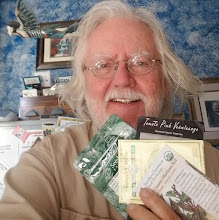 Pickled beets just as the lids are popping as they cool (a sure indication that they have sealed properly) are a popular condiment at my table. These Golden Beets were prepared by high school students (golden beets don't bleed and stain like their red counterparts) who were much chagrined to learn they needed to wait six (S-I-X!!!) weeks before tasting the fruits of their labors.
Pickled beets just as the lids are popping as they cool (a sure indication that they have sealed properly) are a popular condiment at my table. These Golden Beets were prepared by high school students (golden beets don't bleed and stain like their red counterparts) who were much chagrined to learn they needed to wait six (S-I-X!!!) weeks before tasting the fruits of their labors.I come to my environmentalism against the grain, by which I mean, I live in West-crises?- What-crises?-wood, California, a upscale portion of Los Angeles. My little bungalow home not only has no insulation, but a fellow can actually feel the breeze flow through on blustery days. Waking up here is like coming to in a refrigerator; it is frequently warmer outside than in. I bound out of bed, dressing quickly, pulling on my wonderful shawl collar wool sweater, a wool beret and tie a wool scarf around my neck. After pulling on my down booties, I thank God that I can sip wonderfully hot coffee and write on a laptop where the electronics within warm my fingers on the keyboard.
I rent my little bungalow. I have done a number of things to mitigate the lacks of this home and this is where I find myself after I've done what I can do. I live in a sweet little part of Los Angeles and I pay a ridiculously low rent which makes me loathe to ask for changes from my landlady. I do not run the electric heater that is a part of this house, I use a portable electric heater when I must. I have a propane heater that warms me as I dry from my shower and dress. From the McMansions going up all around me and the Hummer homes that dot my neighborhood, I feel my carbon footprint is a pretty good departure from my neighbors'.
Looking to others for comparison, however, is not valuable or instructive. My own footprint has progressively lessened over the past few years. I find that mark more useful to consider as my measure progress. Sadly, many lag considerably behind others in getting the message. I cannot fathom how the family down the street can consider the impact as they commence to remodel a perfectly usable bungalow into our latest McMansion, while the conscious among us have turned off sprinklers, cut heat, and changed our lifestyles towards reducing our impact on the earth.
Still. A quick look at the future convinces me that certain parts of our economy will change as the tanker sinks on cheap, easy oil.
In my home, and all of those around me, there is no pantry. Someone with carpentry skills and some entrepreneurial acumen could figure out strategies by which existing homes, no matter how small or large, can be retrofitted with something that can be a pantry to store food that is either grown at home, or purchased in season at a local farmers market. Something that can approach a root cellar to hold root crops as they were once held in homes all over America would be much more valuable in the coming years than a big screen TV. And would be produced locally by local craftspeople and not built of plastic (destined for the inevitable landfill) and imported from thousands of miles away.
Canning jar manufacturers have disappeared over these past few decades. Now it is sad to report that the two remaining icon brands of home canning are, in fact, owned by the same company. The only brands available for most Americans putting food by are Ball and Kerr, neither owned by Ball or Kerr, but by Alltrista Corporation. Even the original brand of canning jars, once the ubiquitous Mason jar, has completely become the pleasure of collectors and no longer makes appearance in the canners arsenal. (More information on the history of canning jars can be found at this link.)
Alltrista could do itself proud by expanding its offerings to the home consumer and building on the possibility that homemakers of the very near future will want to decrease their dependence on canned products shipped in at dubious expense from overseas containing products that has little oversight in it's production and quality control.
Most landgrant colleges have not only master gardener programs, but master home canners programs as well. As the economics of the last eight plus years have trimmed the budgets of these venerable institutions, many of these very essential programs have been cut. I was the recipient of this downsizing in a dichotomous moment. I learned of the sale of jars and equipment of the Los Angeles County Master Home Canners program in 2005 and was one of only a few that showed up to purchase these remains of the defunct program. For a song (a melancholy song at that), I ended up with a much used and sad looking Excalibur dryer that had seen much better days (but still performs like the thoroughbred champion it is) and numerous canning jars of many different shapes and brands. Several of these gorgeous jars end up in my homemade pesto and jams that I take a manifest pride in producing.
And these products, by a strange twist of fate have again become part of the educational system. I have taught several different people how to preserve food using the glass jars and others use my dryer to create dried fruits and herbs for storage.
So. I am busy attending to my own carbon footprint as best I can. I anticipate, eagerly, a time and a place where I have the resources to further reduce my carbon footprint and live a life that impacts this world less. That time will come and I do what I can in the meantime to move towards that goal. I grow a lot of fresh, organic produce; not nearly as much as I would like, but I strive towards more every year. I continue to learn more ways of cooking at home and keeping the food in ever-decreasing usage terms (dried foods, like beans, continue to be a foodstuff for a very long without electricity or propane). Food produced and stored locally are ways to divest myself from the consumption of oil. Driving the speed limit (God bless my right foot with lightness and my rear view mirror with forgetfulness for the hordes of Californians held up in my plodding wake) is one way that I am trying to immediately lower my dependence on oil no matter what model of car I drive. It would do me well to park the car more often as well – walking and biking are not only ecologically sound, but have health ramifications that my doctor would rejoice at as well.
I have often held to the conviction “What blesses one, blesses all.” There is no doubt that changes afoot will negatively impact some business and skill sets, just as wholesale adoption of the automobile in the early 1900's had a huge impact on the employment prospects of, say, wheelwrights and others. That does not mean that wheelwrights had to go on the dole. It does mean that there had to be changes made. A fellow in wheelwright school in 1914 might well have looked into the crystal ball of his day and thought, “gosh, maybe I should reconsider my plan to feed my family.” That change of plans does not necessarily mean the devastation of a life.
We have all adapted our lives to accommodate the personal computer – for better or for worse. We will all soon get to adapt again. One of the very (very) few things I actually remember from my 9th grade biology class (I failed biology twice in high school and as a senior had to take it a third time to facilitate my graduation – I could not do the required dissection of frogs and worms and finally was put into an honors class where I could replace animal dissection with a study of plants), that life may be defined as the ability to change.
How alive we all actually are will determine, in ever increasing measure, how successfully we can navigate the immediate future crises. I shall knit myself an even warmer scarf. Too bad I can't grow the sheep for the wool!
david









.jpg)
No comments:
Post a Comment